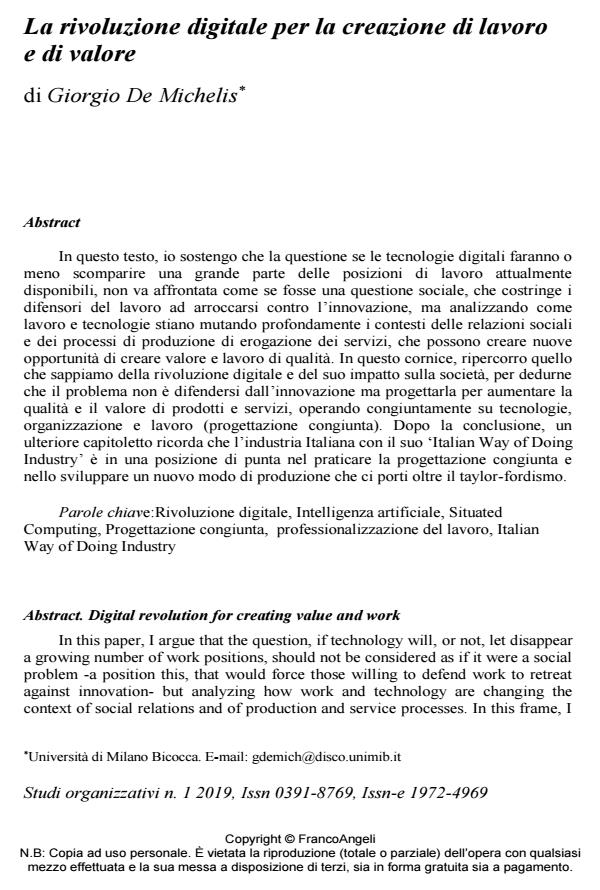Digital revolution for creating value and work
Journal title STUDI ORGANIZZATIVI
Author/s Giorgio De Michelis
Publishing Year 2019 Issue 2019/1
Language Italian Pages 24 P. 125-148 File size 532 KB
DOI 10.3280/SO2019-001005
DOI is like a bar code for intellectual property: to have more infomation
click here
Below, you can see the article first page
If you want to buy this article in PDF format, you can do it, following the instructions to buy download credits

FrancoAngeli is member of Publishers International Linking Association, Inc (PILA), a not-for-profit association which run the CrossRef service enabling links to and from online scholarly content.
In this paper, I argue that the question, if technology will, or not, let disappear a growing number of work positions, should not be considered as if it were a social problem -a position this, that would force those willing to defend work to retreat against innovation- but analyzing how work and technology are changing the context of social relations and of production and service processes. In this frame, I review what we know about digital revolution and its impact on society, concluding that the problem is not defend work from innovation, but designing the latter for augmenting quality and value of products and services, jointly considering technology, organization and work (joint design). After the conclusion, a very final short chapter, recalls that the Italian industry, with its "Italian Way of Doing Industry" is in a leading position in practicing joint design and in developing a new production mode, going beyond Taylor-Fordism.
Keywords: Digital Revolution, Artificial Intelligence, Situated Computing, Joint Design, Professionalization of Work, Italian Way of Doing Industry
- C'è una rivoluzione in corso e il lavoro ne è pienamente investito Giorgio De Michelis, in STUDI ORGANIZZATIVI 1/2023 pp.120
DOI: 10.3280/SO2023-001006 - Le condizioni organizzative e professionali dello smart working dopo l'emergenza: progettare il lavoro ubiquo fatto di ruoli aperti e di professioni a larga banda Federico Butera, in STUDI ORGANIZZATIVI 1/2020 pp.141
DOI: 10.3280/SO2020-001006
Giorgio De Michelis, La rivoluzione digitale per la creazione di lavoro e di valore in "STUDI ORGANIZZATIVI " 1/2019, pp 125-148, DOI: 10.3280/SO2019-001005